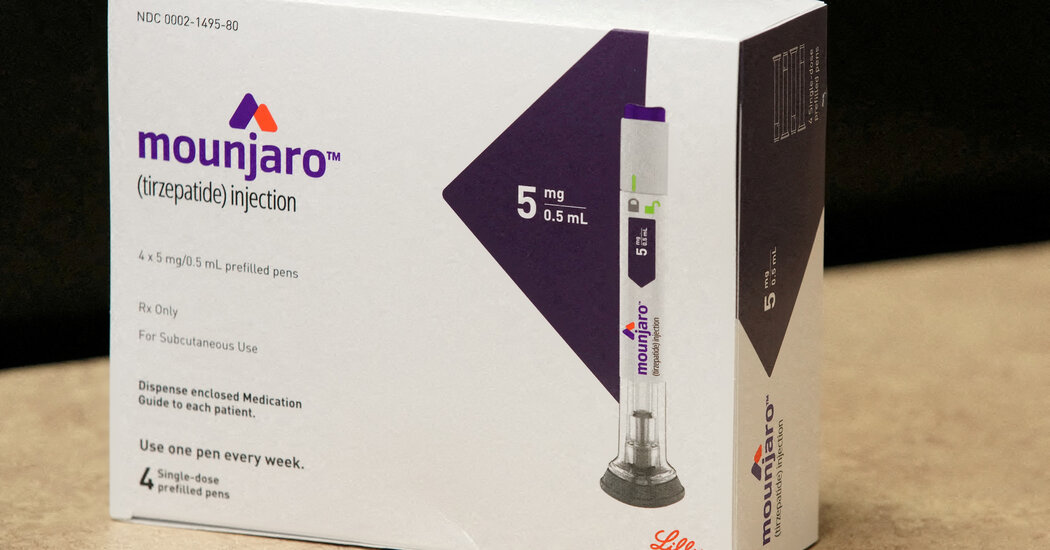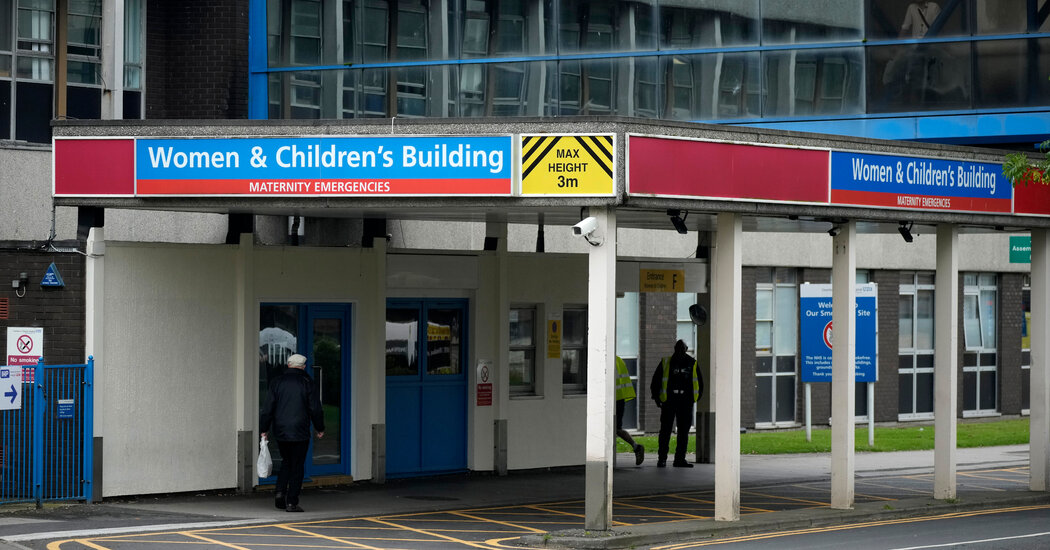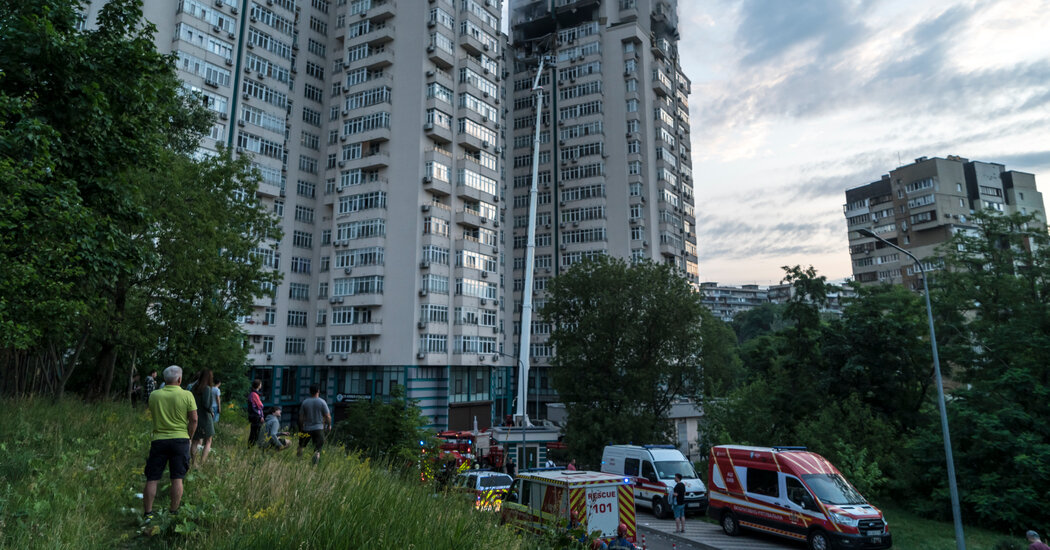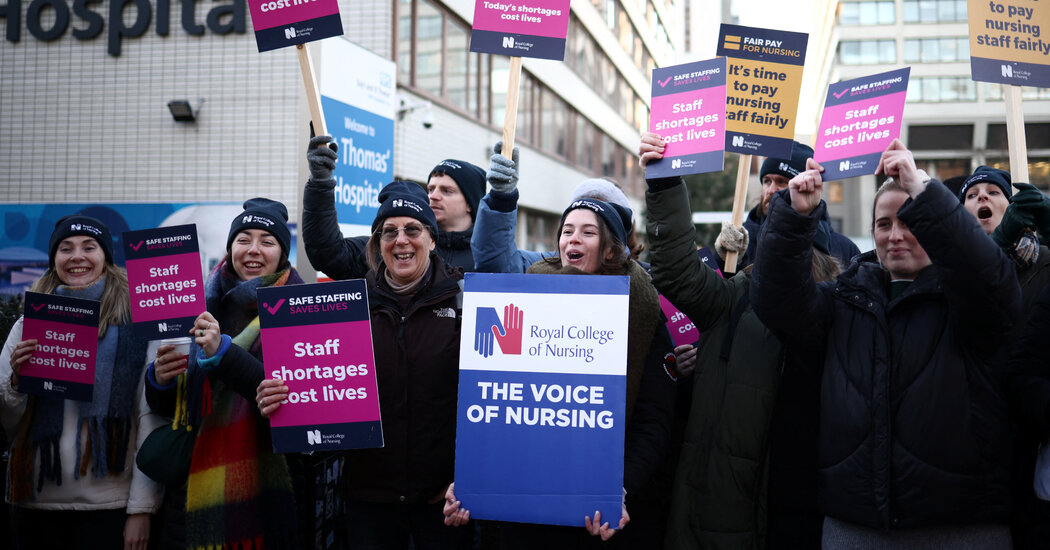Emergency responders in Ukraine’s capital offer not only physical care to the victims of airstrikes, but also mental health support for survivors in crisis.Hands shaking as she covered her mouth, a woman looked toward a gaping hole in the side of a high-rise, the contents of apartments spilling out of its side.Standing alongside her was Ivanka Davydenko, 29, wearing a blue uniform with “Psychologist” emblazoned in yellow on both sides, her arm placed gently across the woman’s back.She handed her a paper cup of water and asked how she could help. The woman’s son lived on the building’s 18th floor, she explained, and he was not answering his phone. Most of that floor was gone.“We help people because they are in a state of shock and do not always understand what they need at the moment,” Ms. Davydenko said. “We offer banal things: water, coffee, a blanket.”A woman searching for her son, who lived in the building in Kyiv that was hit by a missile on June 24, talked with emergency responders.Brendan Hoffman for The New York TimesMs. Davydenko is a member of a small team within Ukraine’s State Emergency Services, delivering psychological first aid at moments of crisis in the capital, Kyiv. She arrived minutes after a Russian attack, early on the morning of June 24, in which Ukrainian air defenses destroyed incoming missiles, causing fragments to careen into apartments.Russia’s attacks on Ukraine have forced its emergency crews to face not only fire, smoke and blood, but also the rippling psychological effects felt by people experiencing war. Public health experts warn that millions of Ukrainians will probably develop a mental health condition because of the invasion, and that the number will only grow as the days of bombardment, violence and grief go on.So Ukraine’s emergency crews include not only firefighters, paramedics and police officers, but also psychologists, including Ms. Davydenko, to help people dealing with the immediate effects of shock or other acute mental health care needs. There are similar efforts in other cities, but with Russian missiles persistently raining down horror on the capital, the Kyiv team is perhaps the busiest.“Before, we used to respond to serious and large-scale emergencies, like a gas explosion and where a lot of people needed to be evacuated,” said Liubov Kirnos, the Kyiv unit’s manager. “When the war started, we were on duty all the time, we didn’t leave the city.”Liubov Kirnos in June in Kyiv. “When the war started, we were on duty all the time, we didn’t leave the city,” she said.Brendan Hoffman for The New York TimesLike other emergency workers, the psychologists are on call. When an attack happens, a coordination center sends a team racing to the site. There, psychologists often find people crying, frozen in shock or breaking down.“When we meet a person for the first time, we ask, ‘What do you need right now? How are you feeling right now?’” Ms. Kirnos said. Some people simply ask the psychologists to stay close for a while. “They might be expecting their loved ones to be taken out from the rubble,” she said.That was the case on June 24 with the mother Ms. Davydenko was supporting. The psychologist walked with her as she consulted a list of people taken to hospitals or missing.Outside the building that was struck. City officials said five people had been killed.Brendan Hoffman for The New York TimesBut as they walked away, a firefighter said in a low voice that there was nothing left on the 18th floor, where her son had lived.Residents had been sleeping when the strike tore open their building before dawn. The bodies of at least two victims had been thrown from the building along with twisted metal, insulation and fragments of furniture, scattering into the parking lot below.Dozens of people stood in shock, Ms. Davydenko said, including some who had seen dead bodies and others who were wounded but did not fully understand they were bleeding.Ms. Davydenko and another colleague at the site would help around 45 people over some 12 hours. Iryna Kuts, 62, went to Ms. Davydenko with her daughter, still trembling from shock, asking for some water and a moment to speak.Ms. Kuts described being jolted from sleep in her 19th-floor apartment, and then her room filling with smoke.Ivanka Davydenko, a psychologist with the Kyiv Emergency Services, at the scene of the damaged apartment building.Brendan Hoffman for The New York Times“We were just hugging, thinking we would suffocate,” she said. They eventually made their way down the stairs, helped by police officers, but were surveying the ruins of their apartment building in a stupor.“We provide psychological first aid to people with anxiety, stress, crying, aggression,” Ms. Davydenko explained. “Then we work with people who stay on the benches, in the yard, because it’s like a second emotional wave is hitting.”A young woman in a white tank top who had been wandering the parking lot sobbing was led over. The woman’s father, a resident, had survived the strike but was refusing to come out.“Don’t worry, everything will be fine,” Ms. Davydenko told her, holding her arm, adding that firefighters would help her father out. “But you cannot go in — no one can.”She waited until the father finally emerged, and the young woman threw her arms around his neck, weeping.A woman waiting for her father to emerge from the damaged apartment building.Brendan Hoffman for The New York TimesNot everyone would have such a happy reunion. Later in the day, Ms. Davydenko accompanied the mother and her husband, who had been looking for their son, to examine the badly mutilated remains of a body.They were still awaiting official DNA confirmation, but the remains were most likely her son’s, the psychologist explained.The next day, city officials confirmed that five people had been killed in the strike.Public health experts like Dr. Jarno Habicht, the head of the World Health Organization’s office in Ukraine, have warned of the war’s long-term and widespread effects on mental health. In an interview, he said that an estimated 10 million people would most likely develop some form of mental health condition because of Russia’s invasion.The W.H.O. estimate, based on an analysis of how other conflicts had affected mental health, will probably increase the longer the war drags on, he added. Stress-induced disorders, including anxiety and depression, are among experts’ main concerns.The key to addressing mental health concerns in Ukraine, Dr. Habicht said, “is not waiting until the war is over.”A handful of programs have sought to help Ukrainians, including one spearheaded by Olena Zelenska, the first lady, that aims to make high-quality, affordable mental health services available to people across the country.Much of the apartment building’s 18th floor was destroyed.Brendan Hoffman for The New York TimesUkraine’s Ministry of Health, the W.H.O. and more than a dozen other partners have also begun a program to train primary care physicians on how to treat patients with depression, anxiety, post-traumatic stress disorder, suicidal behavior and substance abuse.But programs like the emergency team of psychologists try to provide an early intervention in moments of crisis.“If you don’t deal with stress right away, it can turn into long-term stress, which can turn into P.T.S.D.,” said Ms. Kirnos. “It’s aimed at helping bring home the idea to people that, ‘You were in danger, but now you’re safe.’ If we don’t do this right away, people might get stuck in this state.”Still, the burden can also be heavy for those giving psychological care. Days after the missile attack on Kyiv, Ms. Davydenko said team members were working with their own therapists to process what they had seen.“Of course,” she said, “I am also a human being.”Oleksandr Chubko
Read more →





